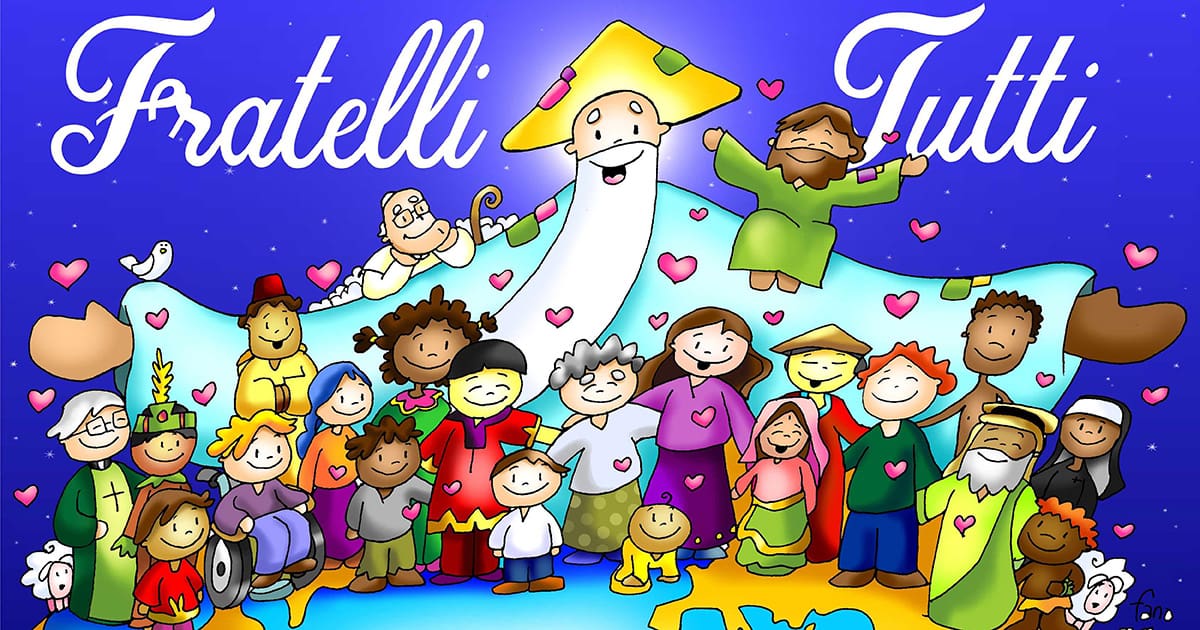On the eve of the feast of Saint Francis of Assisi, 4 October 2020, Pope Francis published his third encyclical letter: ‘Fratelli tutti‘.
As the person in charge within an international congregation that fulfils a clear mission in the world, more specifically in the world of education and health care, on the basis of its own charism, Bro. René Stockman offers here a short summary of each chapter followed by a more personal reflection.
Chapter 4: A heart open to the whole world
This chapter looks at a very topical problem and discusses how we can deal with it in an evangelically responsible fashion.
The problem of migration, which is dealt with in detail here, is, of course, a complex issue for which there are no ready-made solutions. Ideally, we should avoid unnecessary migration by creating the possibility of living safely and with dignity in countries of origin as much as possible. But at the same time, everyone has the right to look for a place for themselves and their families where they can develop fully as a person. Four verbs should always be paramount when it comes to migrants: welcome, protect, promote, and integrate. This can be put into practice, for instance, by facilitating the obtaining of visas, by developing humanitarian corridors for refugees who are genuinely in an emergency situation, by providing suitable accommodation and the necessary social support, with the right to integration into the education system and the safeguarding of religious freedom. When migrants receive their citizenship, it must be on the basis of full equality with the other citizens of the country. In order to achieve all this, cooperation is needed between the various bodies involved in the reception of refugees and migrants in the country.
The arrival of people from different cultures should not immediately be viewed as a threat, but rather as a mutual enrichment. Let us not forget how many countries were actually shaped by intercontinental migration, just think of the whole of the American continent. It is therefore really necessary today to make positive efforts to achieve a smoother rapprochement between East and West, taking into account and respecting cultural, historical, and religious differences. That is why we are once again calling for a new legal, political, and economic world order that can look after and deal with precisely these new problems on a global scale. What is important here is that there should be room even for the poorest to make their voices heard and take part in the decision-making process. Too often, decisions are still made about them without any form of participation on their part. The aspect of gratuitousness needs to remain a fundamental attitude: when people come knocking at our door, and this also applies to the wider community, we should not ask straight away what benefit they bring us. The criterion must always be that we continue to see each other as part of the great human family and not be fixated on the differences that exist. The poles of ‘globalization’ and ‘localization’ will always be present and cannot simply be suppressed or denied, but we must ensure that they are brought to a viable balance. Globalization does not necessarily hinder the respect and growth of the local; it can also enrich it. I go to the other person with my own origins, which I do not necessarily have to deny, but at the same time I am open to the other person’s origins. Growing towards a greater universality does not mean that we have to standardize everything and deny our own history and roots. No, we should not build a Tower of Babel, for that is only an expression of pride and false ambitions. It is a question of acting locally, but always with openness to a broader perspective. Closing ourselves off to this is the breeding ground for an unhealthy nationalism and populism that, unfortunately, is becoming more and more prevalent. Every culture must be open to universal values. The love of one’s own country does not contradict the heartfelt openness and integration of a more global humanity. Let us see the whole human community as one big family, and there are many internal differences in every family, but they are not irreconcilable.
The subject of migration leaves no one unmoved in this day and age, and once again it is a matter of seeing what we ourselves, as individuals and as a small community, can do to develop that greater openness and positive attitude towards migrants. We deal with migrants in both health care and education, and this will require our special attention in order to help them integrate fully so that they feel truly at home in our care and education and are not regarded as second-class citizens. Within the Congregation itself, internationalization is growing very strongly, and here, too, we are invited to appreciate this in a positive way and to really benefit from it. Is it not an enrichment of our charism that this can now take shape and grow in so many different cultures? Life in international communities is a challenge, but above all a gift and a mutual enrichment, provided that mutual respect prevails and no superiority of one or the other reigns. In the past, many brother missionaries have experienced life in a completely different culture as a real personal enrichment by discovering new values that were lost in other parts of the world. At the same time, they were allowed to share their own culture with others and enrich them with it. Are we now also sufficiently and willingly open to the other direction when brothers from the South or the East live in northern regions and help shape the charism? The feeling of superiority remains a dangerous problem that needs to be challenged at every turn.
Bro. René Stockman,
Superior General of the Brothers of Charity
Source: Brothers of Charity Website








0 Comments